Academic and Career Skills: High Staff Turnover Report for Travelodge
VerifiedAdded on 2020/02/03
|21
|6737
|471
Report
AI Summary
This report provides an executive summary and detailed analysis of the problem of high staff turnover at Travelodge Hotels, focusing on its impact on business operations. The report recommends strategies for analyzing the situation and implementing actions to reduce the impact of high staff turnover. It includes an introduction to the business topic of high staff turnover, demonstrating relationships between concepts, theories, and best practices. The report critically analyzes data, suggests a communication strategy, and provides recommendations for practical business solutions. It also includes a personal contribution to the organization, areas of strength, development, and professional career-ready skills. The report concludes with a career development plan, references, and an appendix.
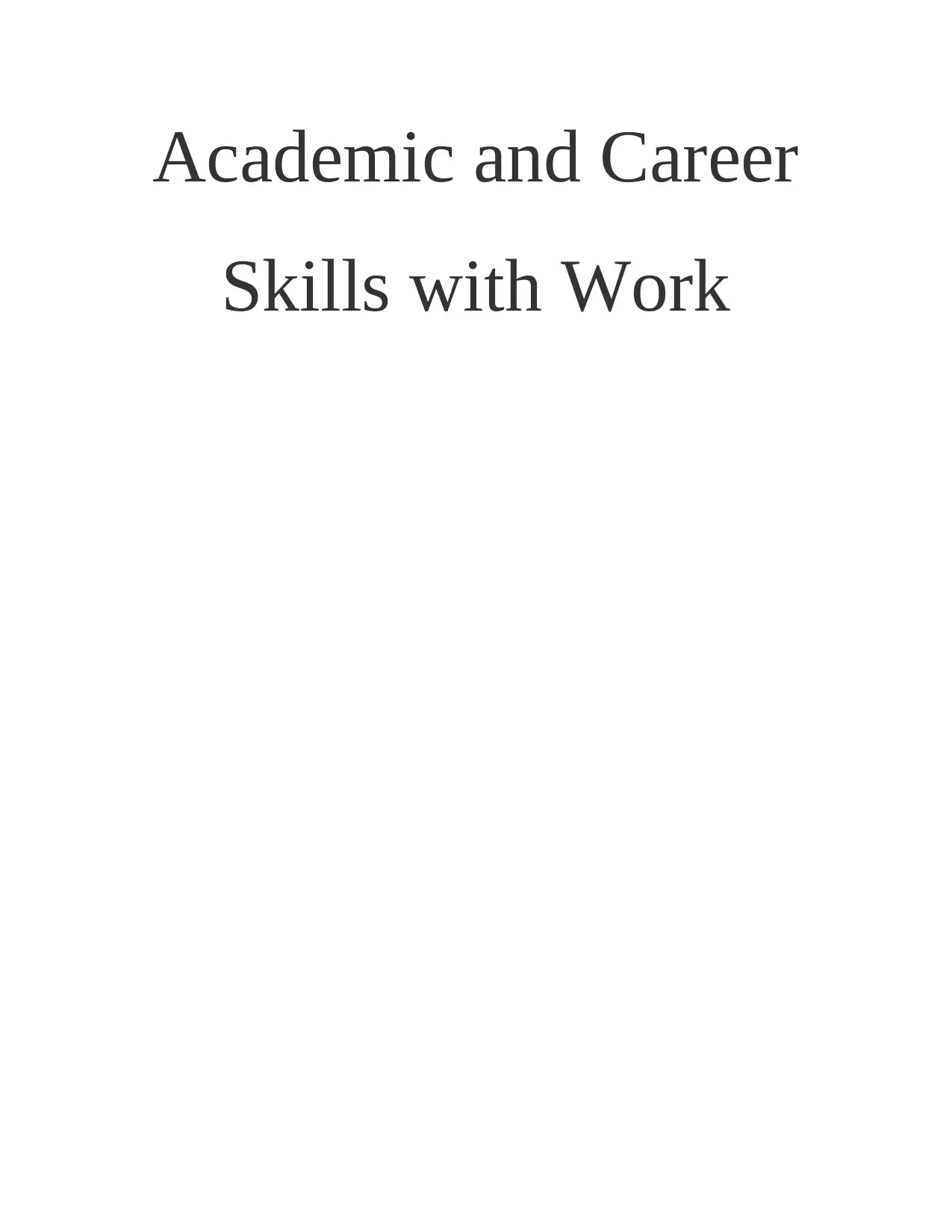
Academic and Career
Skills with Work
Skills with Work
Paraphrase This Document
Need a fresh take? Get an instant paraphrase of this document with our AI Paraphraser
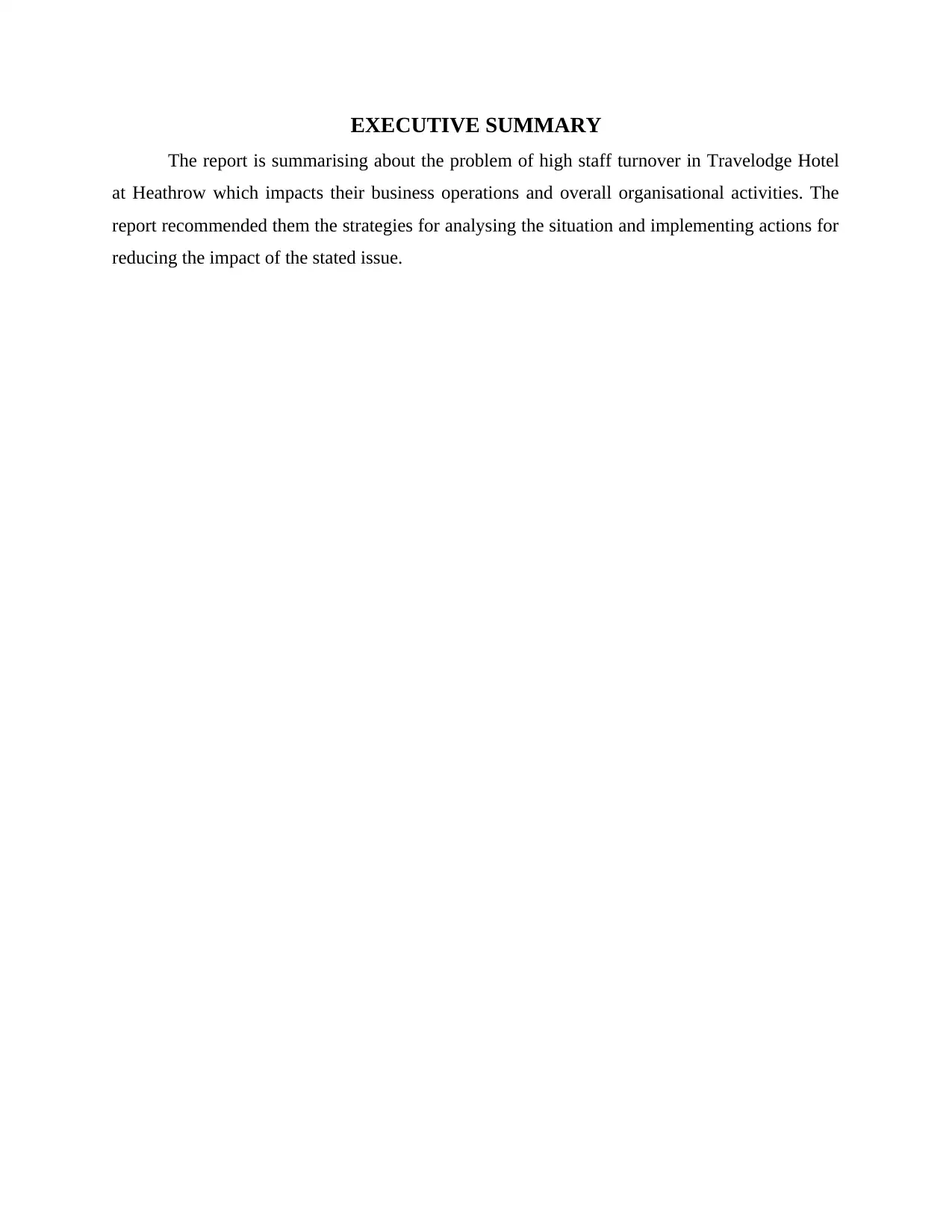
EXECUTIVE SUMMARY
The report is summarising about the problem of high staff turnover in Travelodge Hotel
at Heathrow which impacts their business operations and overall organisational activities. The
report recommended them the strategies for analysing the situation and implementing actions for
reducing the impact of the stated issue.
The report is summarising about the problem of high staff turnover in Travelodge Hotel
at Heathrow which impacts their business operations and overall organisational activities. The
report recommended them the strategies for analysing the situation and implementing actions for
reducing the impact of the stated issue.
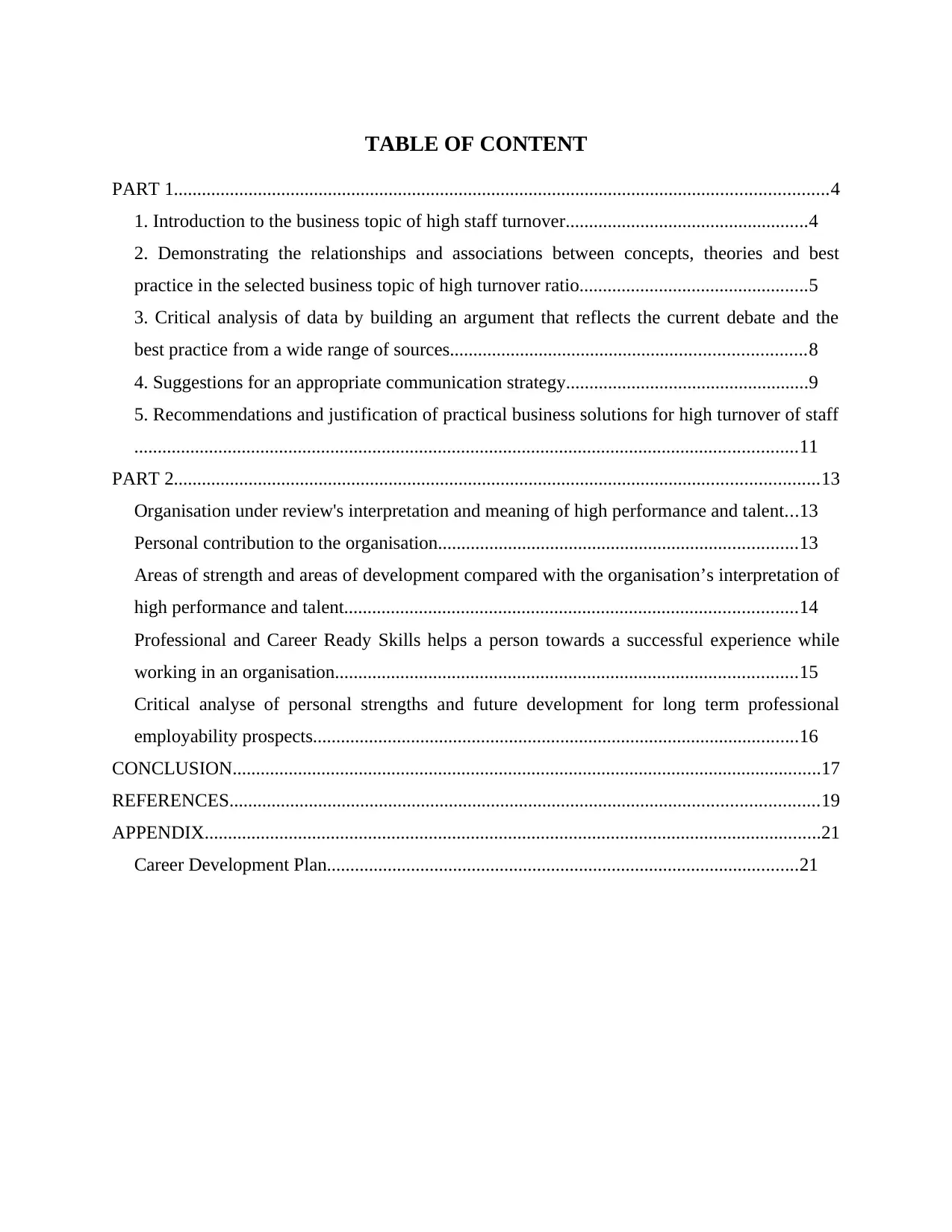
TABLE OF CONTENT
PART 1............................................................................................................................................4
1. Introduction to the business topic of high staff turnover....................................................4
2. Demonstrating the relationships and associations between concepts, theories and best
practice in the selected business topic of high turnover ratio.................................................5
3. Critical analysis of data by building an argument that reflects the current debate and the
best practice from a wide range of sources............................................................................8
4. Suggestions for an appropriate communication strategy....................................................9
5. Recommendations and justification of practical business solutions for high turnover of staff
..............................................................................................................................................11
PART 2..........................................................................................................................................13
Organisation under review's interpretation and meaning of high performance and talent...13
Personal contribution to the organisation.............................................................................13
Areas of strength and areas of development compared with the organisation’s interpretation of
high performance and talent.................................................................................................14
Professional and Career Ready Skills helps a person towards a successful experience while
working in an organisation...................................................................................................15
Critical analyse of personal strengths and future development for long term professional
employability prospects........................................................................................................16
CONCLUSION..............................................................................................................................17
REFERENCES..............................................................................................................................19
APPENDIX....................................................................................................................................21
Career Development Plan.....................................................................................................21
PART 1............................................................................................................................................4
1. Introduction to the business topic of high staff turnover....................................................4
2. Demonstrating the relationships and associations between concepts, theories and best
practice in the selected business topic of high turnover ratio.................................................5
3. Critical analysis of data by building an argument that reflects the current debate and the
best practice from a wide range of sources............................................................................8
4. Suggestions for an appropriate communication strategy....................................................9
5. Recommendations and justification of practical business solutions for high turnover of staff
..............................................................................................................................................11
PART 2..........................................................................................................................................13
Organisation under review's interpretation and meaning of high performance and talent...13
Personal contribution to the organisation.............................................................................13
Areas of strength and areas of development compared with the organisation’s interpretation of
high performance and talent.................................................................................................14
Professional and Career Ready Skills helps a person towards a successful experience while
working in an organisation...................................................................................................15
Critical analyse of personal strengths and future development for long term professional
employability prospects........................................................................................................16
CONCLUSION..............................................................................................................................17
REFERENCES..............................................................................................................................19
APPENDIX....................................................................................................................................21
Career Development Plan.....................................................................................................21
⊘ This is a preview!⊘
Do you want full access?
Subscribe today to unlock all pages.

Trusted by 1+ million students worldwide
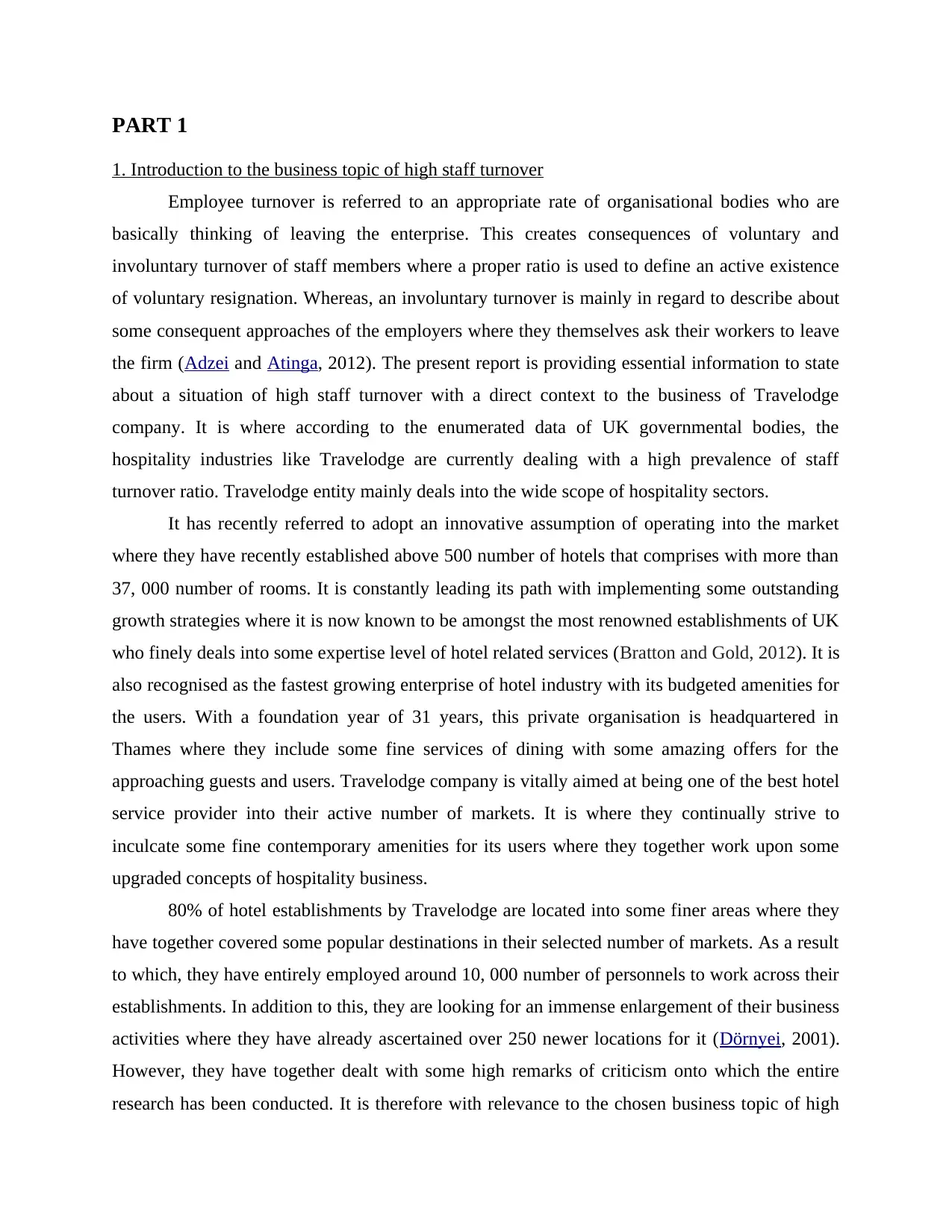
PART 1
1. Introduction to the business topic of high staff turnover
Employee turnover is referred to an appropriate rate of organisational bodies who are
basically thinking of leaving the enterprise. This creates consequences of voluntary and
involuntary turnover of staff members where a proper ratio is used to define an active existence
of voluntary resignation. Whereas, an involuntary turnover is mainly in regard to describe about
some consequent approaches of the employers where they themselves ask their workers to leave
the firm (Adzei and Atinga, 2012). The present report is providing essential information to state
about a situation of high staff turnover with a direct context to the business of Travelodge
company. It is where according to the enumerated data of UK governmental bodies, the
hospitality industries like Travelodge are currently dealing with a high prevalence of staff
turnover ratio. Travelodge entity mainly deals into the wide scope of hospitality sectors.
It has recently referred to adopt an innovative assumption of operating into the market
where they have recently established above 500 number of hotels that comprises with more than
37, 000 number of rooms. It is constantly leading its path with implementing some outstanding
growth strategies where it is now known to be amongst the most renowned establishments of UK
who finely deals into some expertise level of hotel related services (Bratton and Gold, 2012). It is
also recognised as the fastest growing enterprise of hotel industry with its budgeted amenities for
the users. With a foundation year of 31 years, this private organisation is headquartered in
Thames where they include some fine services of dining with some amazing offers for the
approaching guests and users. Travelodge company is vitally aimed at being one of the best hotel
service provider into their active number of markets. It is where they continually strive to
inculcate some fine contemporary amenities for its users where they together work upon some
upgraded concepts of hospitality business.
80% of hotel establishments by Travelodge are located into some finer areas where they
have together covered some popular destinations in their selected number of markets. As a result
to which, they have entirely employed around 10, 000 number of personnels to work across their
establishments. In addition to this, they are looking for an immense enlargement of their business
activities where they have already ascertained over 250 newer locations for it (Dörnyei, 2001).
However, they have together dealt with some high remarks of criticism onto which the entire
research has been conducted. It is therefore with relevance to the chosen business topic of high
1. Introduction to the business topic of high staff turnover
Employee turnover is referred to an appropriate rate of organisational bodies who are
basically thinking of leaving the enterprise. This creates consequences of voluntary and
involuntary turnover of staff members where a proper ratio is used to define an active existence
of voluntary resignation. Whereas, an involuntary turnover is mainly in regard to describe about
some consequent approaches of the employers where they themselves ask their workers to leave
the firm (Adzei and Atinga, 2012). The present report is providing essential information to state
about a situation of high staff turnover with a direct context to the business of Travelodge
company. It is where according to the enumerated data of UK governmental bodies, the
hospitality industries like Travelodge are currently dealing with a high prevalence of staff
turnover ratio. Travelodge entity mainly deals into the wide scope of hospitality sectors.
It has recently referred to adopt an innovative assumption of operating into the market
where they have recently established above 500 number of hotels that comprises with more than
37, 000 number of rooms. It is constantly leading its path with implementing some outstanding
growth strategies where it is now known to be amongst the most renowned establishments of UK
who finely deals into some expertise level of hotel related services (Bratton and Gold, 2012). It is
also recognised as the fastest growing enterprise of hotel industry with its budgeted amenities for
the users. With a foundation year of 31 years, this private organisation is headquartered in
Thames where they include some fine services of dining with some amazing offers for the
approaching guests and users. Travelodge company is vitally aimed at being one of the best hotel
service provider into their active number of markets. It is where they continually strive to
inculcate some fine contemporary amenities for its users where they together work upon some
upgraded concepts of hospitality business.
80% of hotel establishments by Travelodge are located into some finer areas where they
have together covered some popular destinations in their selected number of markets. As a result
to which, they have entirely employed around 10, 000 number of personnels to work across their
establishments. In addition to this, they are looking for an immense enlargement of their business
activities where they have already ascertained over 250 newer locations for it (Dörnyei, 2001).
However, they have together dealt with some high remarks of criticism onto which the entire
research has been conducted. It is therefore with relevance to the chosen business topic of high
Paraphrase This Document
Need a fresh take? Get an instant paraphrase of this document with our AI Paraphraser
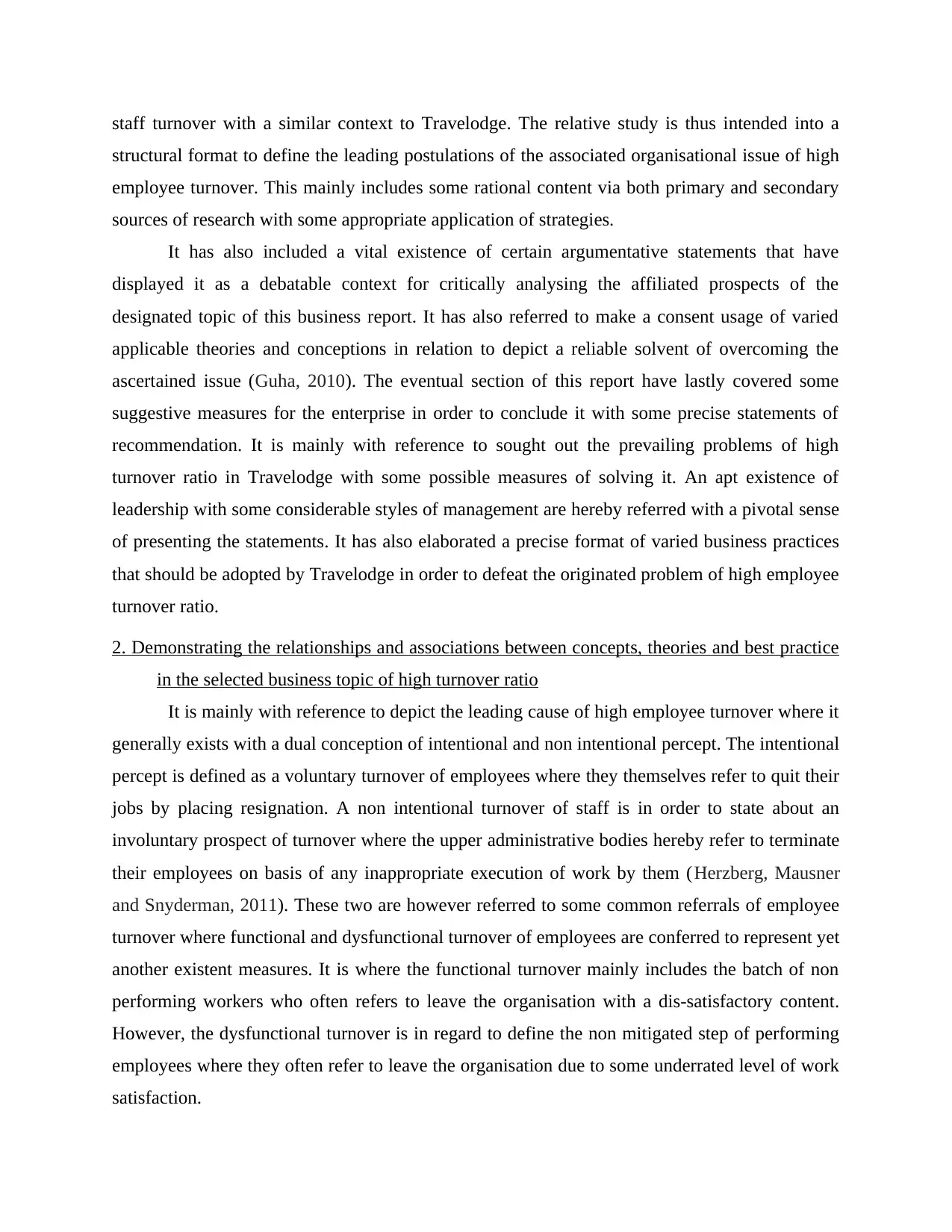
staff turnover with a similar context to Travelodge. The relative study is thus intended into a
structural format to define the leading postulations of the associated organisational issue of high
employee turnover. This mainly includes some rational content via both primary and secondary
sources of research with some appropriate application of strategies.
It has also included a vital existence of certain argumentative statements that have
displayed it as a debatable context for critically analysing the affiliated prospects of the
designated topic of this business report. It has also referred to make a consent usage of varied
applicable theories and conceptions in relation to depict a reliable solvent of overcoming the
ascertained issue (Guha, 2010). The eventual section of this report have lastly covered some
suggestive measures for the enterprise in order to conclude it with some precise statements of
recommendation. It is mainly with reference to sought out the prevailing problems of high
turnover ratio in Travelodge with some possible measures of solving it. An apt existence of
leadership with some considerable styles of management are hereby referred with a pivotal sense
of presenting the statements. It has also elaborated a precise format of varied business practices
that should be adopted by Travelodge in order to defeat the originated problem of high employee
turnover ratio.
2. Demonstrating the relationships and associations between concepts, theories and best practice
in the selected business topic of high turnover ratio
It is mainly with reference to depict the leading cause of high employee turnover where it
generally exists with a dual conception of intentional and non intentional percept. The intentional
percept is defined as a voluntary turnover of employees where they themselves refer to quit their
jobs by placing resignation. A non intentional turnover of staff is in order to state about an
involuntary prospect of turnover where the upper administrative bodies hereby refer to terminate
their employees on basis of any inappropriate execution of work by them (Herzberg, Mausner
and Snyderman, 2011). These two are however referred to some common referrals of employee
turnover where functional and dysfunctional turnover of employees are conferred to represent yet
another existent measures. It is where the functional turnover mainly includes the batch of non
performing workers who often refers to leave the organisation with a dis-satisfactory content.
However, the dysfunctional turnover is in regard to define the non mitigated step of performing
employees where they often refer to leave the organisation due to some underrated level of work
satisfaction.
structural format to define the leading postulations of the associated organisational issue of high
employee turnover. This mainly includes some rational content via both primary and secondary
sources of research with some appropriate application of strategies.
It has also included a vital existence of certain argumentative statements that have
displayed it as a debatable context for critically analysing the affiliated prospects of the
designated topic of this business report. It has also referred to make a consent usage of varied
applicable theories and conceptions in relation to depict a reliable solvent of overcoming the
ascertained issue (Guha, 2010). The eventual section of this report have lastly covered some
suggestive measures for the enterprise in order to conclude it with some precise statements of
recommendation. It is mainly with reference to sought out the prevailing problems of high
turnover ratio in Travelodge with some possible measures of solving it. An apt existence of
leadership with some considerable styles of management are hereby referred with a pivotal sense
of presenting the statements. It has also elaborated a precise format of varied business practices
that should be adopted by Travelodge in order to defeat the originated problem of high employee
turnover ratio.
2. Demonstrating the relationships and associations between concepts, theories and best practice
in the selected business topic of high turnover ratio
It is mainly with reference to depict the leading cause of high employee turnover where it
generally exists with a dual conception of intentional and non intentional percept. The intentional
percept is defined as a voluntary turnover of employees where they themselves refer to quit their
jobs by placing resignation. A non intentional turnover of staff is in order to state about an
involuntary prospect of turnover where the upper administrative bodies hereby refer to terminate
their employees on basis of any inappropriate execution of work by them (Herzberg, Mausner
and Snyderman, 2011). These two are however referred to some common referrals of employee
turnover where functional and dysfunctional turnover of employees are conferred to represent yet
another existent measures. It is where the functional turnover mainly includes the batch of non
performing workers who often refers to leave the organisation with a dis-satisfactory content.
However, the dysfunctional turnover is in regard to define the non mitigated step of performing
employees where they often refer to leave the organisation due to some underrated level of work
satisfaction.
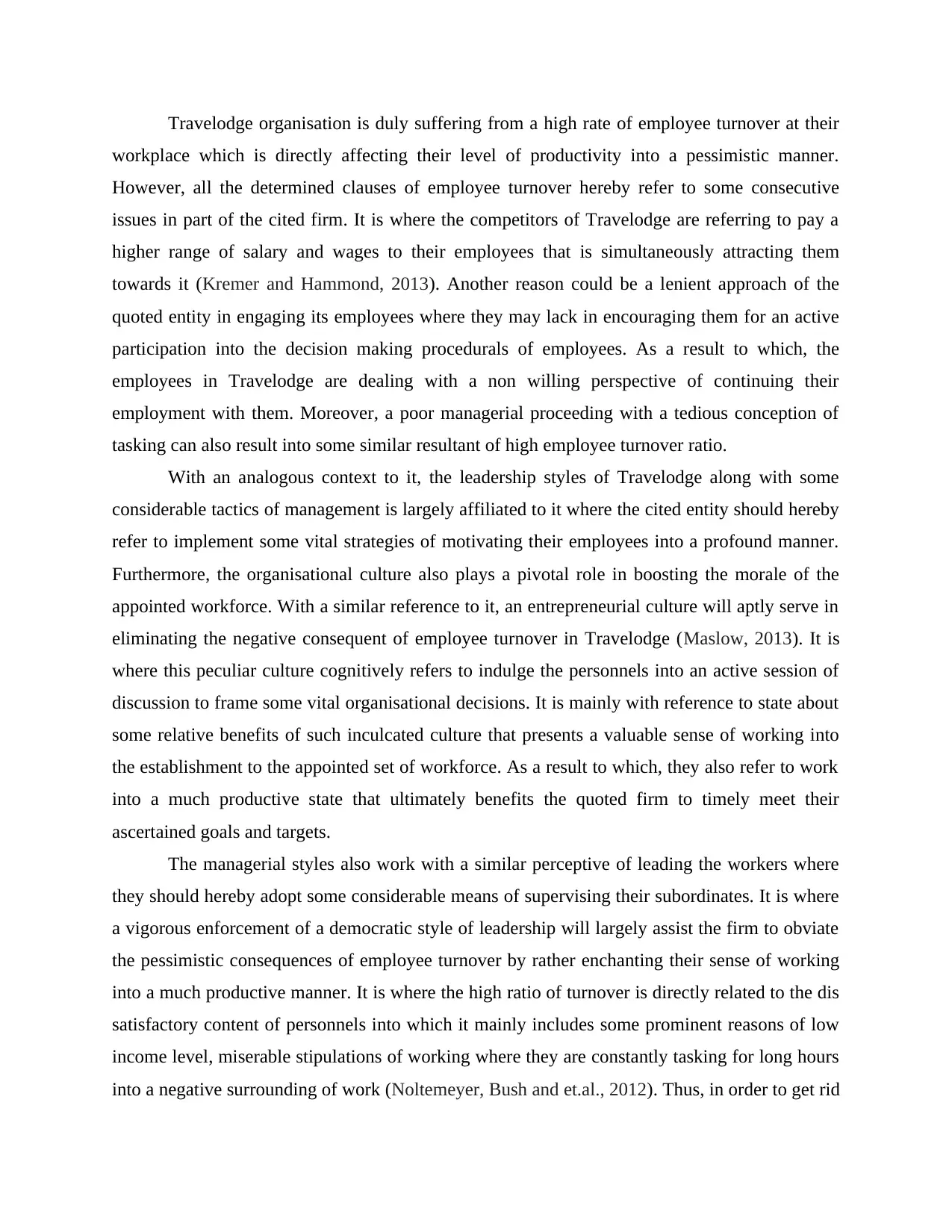
Travelodge organisation is duly suffering from a high rate of employee turnover at their
workplace which is directly affecting their level of productivity into a pessimistic manner.
However, all the determined clauses of employee turnover hereby refer to some consecutive
issues in part of the cited firm. It is where the competitors of Travelodge are referring to pay a
higher range of salary and wages to their employees that is simultaneously attracting them
towards it (Kremer and Hammond, 2013). Another reason could be a lenient approach of the
quoted entity in engaging its employees where they may lack in encouraging them for an active
participation into the decision making procedurals of employees. As a result to which, the
employees in Travelodge are dealing with a non willing perspective of continuing their
employment with them. Moreover, a poor managerial proceeding with a tedious conception of
tasking can also result into some similar resultant of high employee turnover ratio.
With an analogous context to it, the leadership styles of Travelodge along with some
considerable tactics of management is largely affiliated to it where the cited entity should hereby
refer to implement some vital strategies of motivating their employees into a profound manner.
Furthermore, the organisational culture also plays a pivotal role in boosting the morale of the
appointed workforce. With a similar reference to it, an entrepreneurial culture will aptly serve in
eliminating the negative consequent of employee turnover in Travelodge (Maslow, 2013). It is
where this peculiar culture cognitively refers to indulge the personnels into an active session of
discussion to frame some vital organisational decisions. It is mainly with reference to state about
some relative benefits of such inculcated culture that presents a valuable sense of working into
the establishment to the appointed set of workforce. As a result to which, they also refer to work
into a much productive state that ultimately benefits the quoted firm to timely meet their
ascertained goals and targets.
The managerial styles also work with a similar perceptive of leading the workers where
they should hereby adopt some considerable means of supervising their subordinates. It is where
a vigorous enforcement of a democratic style of leadership will largely assist the firm to obviate
the pessimistic consequences of employee turnover by rather enchanting their sense of working
into a much productive manner. It is where the high ratio of turnover is directly related to the dis
satisfactory content of personnels into which it mainly includes some prominent reasons of low
income level, miserable stipulations of working where they are constantly tasking for long hours
into a negative surrounding of work (Noltemeyer, Bush and et.al., 2012). Thus, in order to get rid
workplace which is directly affecting their level of productivity into a pessimistic manner.
However, all the determined clauses of employee turnover hereby refer to some consecutive
issues in part of the cited firm. It is where the competitors of Travelodge are referring to pay a
higher range of salary and wages to their employees that is simultaneously attracting them
towards it (Kremer and Hammond, 2013). Another reason could be a lenient approach of the
quoted entity in engaging its employees where they may lack in encouraging them for an active
participation into the decision making procedurals of employees. As a result to which, the
employees in Travelodge are dealing with a non willing perspective of continuing their
employment with them. Moreover, a poor managerial proceeding with a tedious conception of
tasking can also result into some similar resultant of high employee turnover ratio.
With an analogous context to it, the leadership styles of Travelodge along with some
considerable tactics of management is largely affiliated to it where the cited entity should hereby
refer to implement some vital strategies of motivating their employees into a profound manner.
Furthermore, the organisational culture also plays a pivotal role in boosting the morale of the
appointed workforce. With a similar reference to it, an entrepreneurial culture will aptly serve in
eliminating the negative consequent of employee turnover in Travelodge (Maslow, 2013). It is
where this peculiar culture cognitively refers to indulge the personnels into an active session of
discussion to frame some vital organisational decisions. It is mainly with reference to state about
some relative benefits of such inculcated culture that presents a valuable sense of working into
the establishment to the appointed set of workforce. As a result to which, they also refer to work
into a much productive state that ultimately benefits the quoted firm to timely meet their
ascertained goals and targets.
The managerial styles also work with a similar perceptive of leading the workers where
they should hereby adopt some considerable means of supervising their subordinates. It is where
a vigorous enforcement of a democratic style of leadership will largely assist the firm to obviate
the pessimistic consequences of employee turnover by rather enchanting their sense of working
into a much productive manner. It is where the high ratio of turnover is directly related to the dis
satisfactory content of personnels into which it mainly includes some prominent reasons of low
income level, miserable stipulations of working where they are constantly tasking for long hours
into a negative surrounding of work (Noltemeyer, Bush and et.al., 2012). Thus, in order to get rid
⊘ This is a preview!⊘
Do you want full access?
Subscribe today to unlock all pages.

Trusted by 1+ million students worldwide
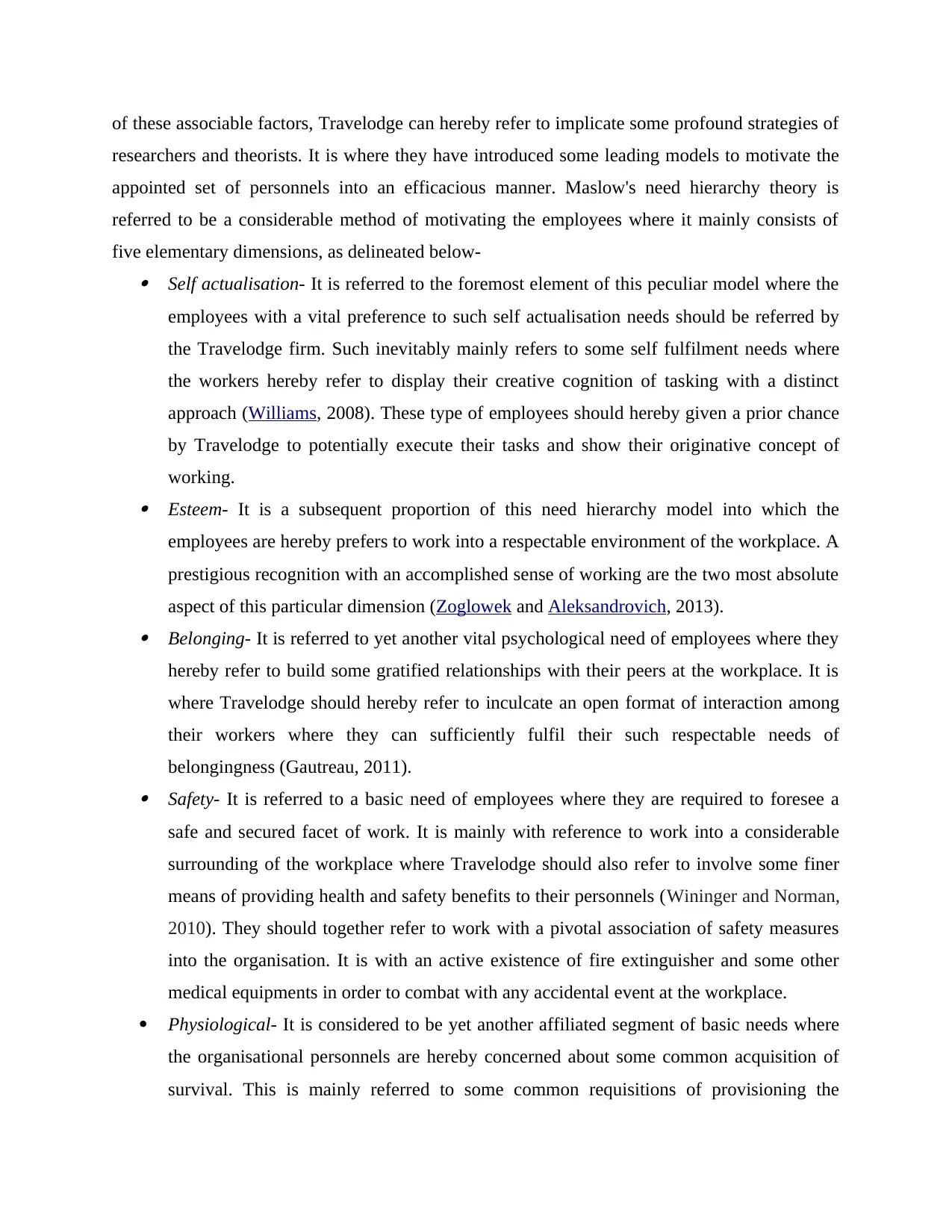
of these associable factors, Travelodge can hereby refer to implicate some profound strategies of
researchers and theorists. It is where they have introduced some leading models to motivate the
appointed set of personnels into an efficacious manner. Maslow's need hierarchy theory is
referred to be a considerable method of motivating the employees where it mainly consists of
five elementary dimensions, as delineated below- Self actualisation- It is referred to the foremost element of this peculiar model where the
employees with a vital preference to such self actualisation needs should be referred by
the Travelodge firm. Such inevitably mainly refers to some self fulfilment needs where
the workers hereby refer to display their creative cognition of tasking with a distinct
approach (Williams, 2008). These type of employees should hereby given a prior chance
by Travelodge to potentially execute their tasks and show their originative concept of
working. Esteem- It is a subsequent proportion of this need hierarchy model into which the
employees are hereby prefers to work into a respectable environment of the workplace. A
prestigious recognition with an accomplished sense of working are the two most absolute
aspect of this particular dimension (Zoglowek and Aleksandrovich, 2013). Belonging- It is referred to yet another vital psychological need of employees where they
hereby refer to build some gratified relationships with their peers at the workplace. It is
where Travelodge should hereby refer to inculcate an open format of interaction among
their workers where they can sufficiently fulfil their such respectable needs of
belongingness (Gautreau, 2011). Safety- It is referred to a basic need of employees where they are required to foresee a
safe and secured facet of work. It is mainly with reference to work into a considerable
surrounding of the workplace where Travelodge should also refer to involve some finer
means of providing health and safety benefits to their personnels (Wininger and Norman,
2010). They should together refer to work with a pivotal association of safety measures
into the organisation. It is with an active existence of fire extinguisher and some other
medical equipments in order to combat with any accidental event at the workplace.
Physiological- It is considered to be yet another affiliated segment of basic needs where
the organisational personnels are hereby concerned about some common acquisition of
survival. This is mainly referred to some common requisitions of provisioning the
researchers and theorists. It is where they have introduced some leading models to motivate the
appointed set of personnels into an efficacious manner. Maslow's need hierarchy theory is
referred to be a considerable method of motivating the employees where it mainly consists of
five elementary dimensions, as delineated below- Self actualisation- It is referred to the foremost element of this peculiar model where the
employees with a vital preference to such self actualisation needs should be referred by
the Travelodge firm. Such inevitably mainly refers to some self fulfilment needs where
the workers hereby refer to display their creative cognition of tasking with a distinct
approach (Williams, 2008). These type of employees should hereby given a prior chance
by Travelodge to potentially execute their tasks and show their originative concept of
working. Esteem- It is a subsequent proportion of this need hierarchy model into which the
employees are hereby prefers to work into a respectable environment of the workplace. A
prestigious recognition with an accomplished sense of working are the two most absolute
aspect of this particular dimension (Zoglowek and Aleksandrovich, 2013). Belonging- It is referred to yet another vital psychological need of employees where they
hereby refer to build some gratified relationships with their peers at the workplace. It is
where Travelodge should hereby refer to inculcate an open format of interaction among
their workers where they can sufficiently fulfil their such respectable needs of
belongingness (Gautreau, 2011). Safety- It is referred to a basic need of employees where they are required to foresee a
safe and secured facet of work. It is mainly with reference to work into a considerable
surrounding of the workplace where Travelodge should also refer to involve some finer
means of providing health and safety benefits to their personnels (Wininger and Norman,
2010). They should together refer to work with a pivotal association of safety measures
into the organisation. It is with an active existence of fire extinguisher and some other
medical equipments in order to combat with any accidental event at the workplace.
Physiological- It is considered to be yet another affiliated segment of basic needs where
the organisational personnels are hereby concerned about some common acquisition of
survival. This is mainly referred to some common requisitions of provisioning the
Paraphrase This Document
Need a fresh take? Get an instant paraphrase of this document with our AI Paraphraser
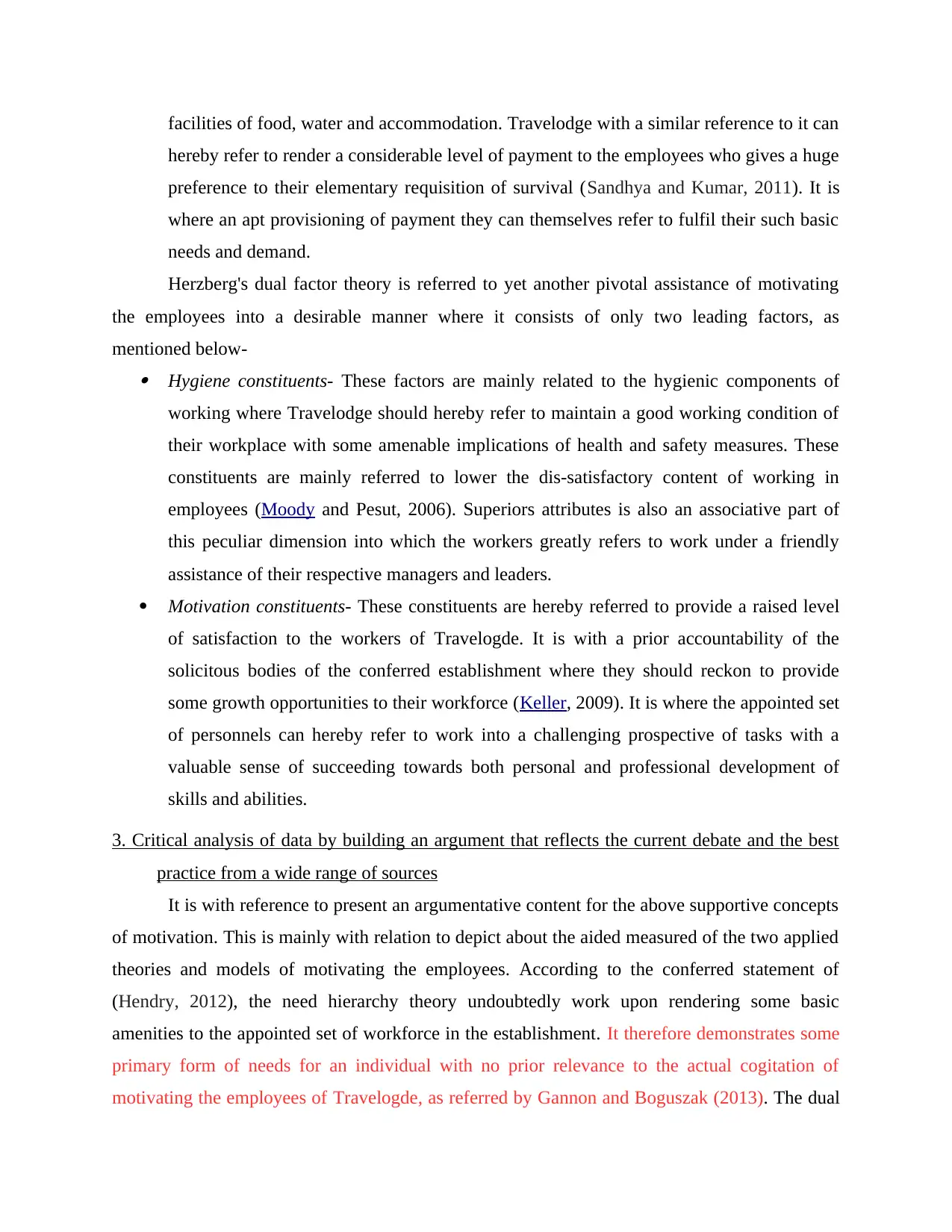
facilities of food, water and accommodation. Travelodge with a similar reference to it can
hereby refer to render a considerable level of payment to the employees who gives a huge
preference to their elementary requisition of survival (Sandhya and Kumar, 2011). It is
where an apt provisioning of payment they can themselves refer to fulfil their such basic
needs and demand.
Herzberg's dual factor theory is referred to yet another pivotal assistance of motivating
the employees into a desirable manner where it consists of only two leading factors, as
mentioned below- Hygiene constituents- These factors are mainly related to the hygienic components of
working where Travelodge should hereby refer to maintain a good working condition of
their workplace with some amenable implications of health and safety measures. These
constituents are mainly referred to lower the dis-satisfactory content of working in
employees (Moody and Pesut, 2006). Superiors attributes is also an associative part of
this peculiar dimension into which the workers greatly refers to work under a friendly
assistance of their respective managers and leaders.
Motivation constituents- These constituents are hereby referred to provide a raised level
of satisfaction to the workers of Travelogde. It is with a prior accountability of the
solicitous bodies of the conferred establishment where they should reckon to provide
some growth opportunities to their workforce (Keller, 2009). It is where the appointed set
of personnels can hereby refer to work into a challenging prospective of tasks with a
valuable sense of succeeding towards both personal and professional development of
skills and abilities.
3. Critical analysis of data by building an argument that reflects the current debate and the best
practice from a wide range of sources
It is with reference to present an argumentative content for the above supportive concepts
of motivation. This is mainly with relation to depict about the aided measured of the two applied
theories and models of motivating the employees. According to the conferred statement of
(Hendry, 2012), the need hierarchy theory undoubtedly work upon rendering some basic
amenities to the appointed set of workforce in the establishment. It therefore demonstrates some
primary form of needs for an individual with no prior relevance to the actual cogitation of
motivating the employees of Travelogde, as referred by Gannon and Boguszak (2013). The dual
hereby refer to render a considerable level of payment to the employees who gives a huge
preference to their elementary requisition of survival (Sandhya and Kumar, 2011). It is
where an apt provisioning of payment they can themselves refer to fulfil their such basic
needs and demand.
Herzberg's dual factor theory is referred to yet another pivotal assistance of motivating
the employees into a desirable manner where it consists of only two leading factors, as
mentioned below- Hygiene constituents- These factors are mainly related to the hygienic components of
working where Travelodge should hereby refer to maintain a good working condition of
their workplace with some amenable implications of health and safety measures. These
constituents are mainly referred to lower the dis-satisfactory content of working in
employees (Moody and Pesut, 2006). Superiors attributes is also an associative part of
this peculiar dimension into which the workers greatly refers to work under a friendly
assistance of their respective managers and leaders.
Motivation constituents- These constituents are hereby referred to provide a raised level
of satisfaction to the workers of Travelogde. It is with a prior accountability of the
solicitous bodies of the conferred establishment where they should reckon to provide
some growth opportunities to their workforce (Keller, 2009). It is where the appointed set
of personnels can hereby refer to work into a challenging prospective of tasks with a
valuable sense of succeeding towards both personal and professional development of
skills and abilities.
3. Critical analysis of data by building an argument that reflects the current debate and the best
practice from a wide range of sources
It is with reference to present an argumentative content for the above supportive concepts
of motivation. This is mainly with relation to depict about the aided measured of the two applied
theories and models of motivating the employees. According to the conferred statement of
(Hendry, 2012), the need hierarchy theory undoubtedly work upon rendering some basic
amenities to the appointed set of workforce in the establishment. It therefore demonstrates some
primary form of needs for an individual with no prior relevance to the actual cogitation of
motivating the employees of Travelogde, as referred by Gannon and Boguszak (2013). The dual
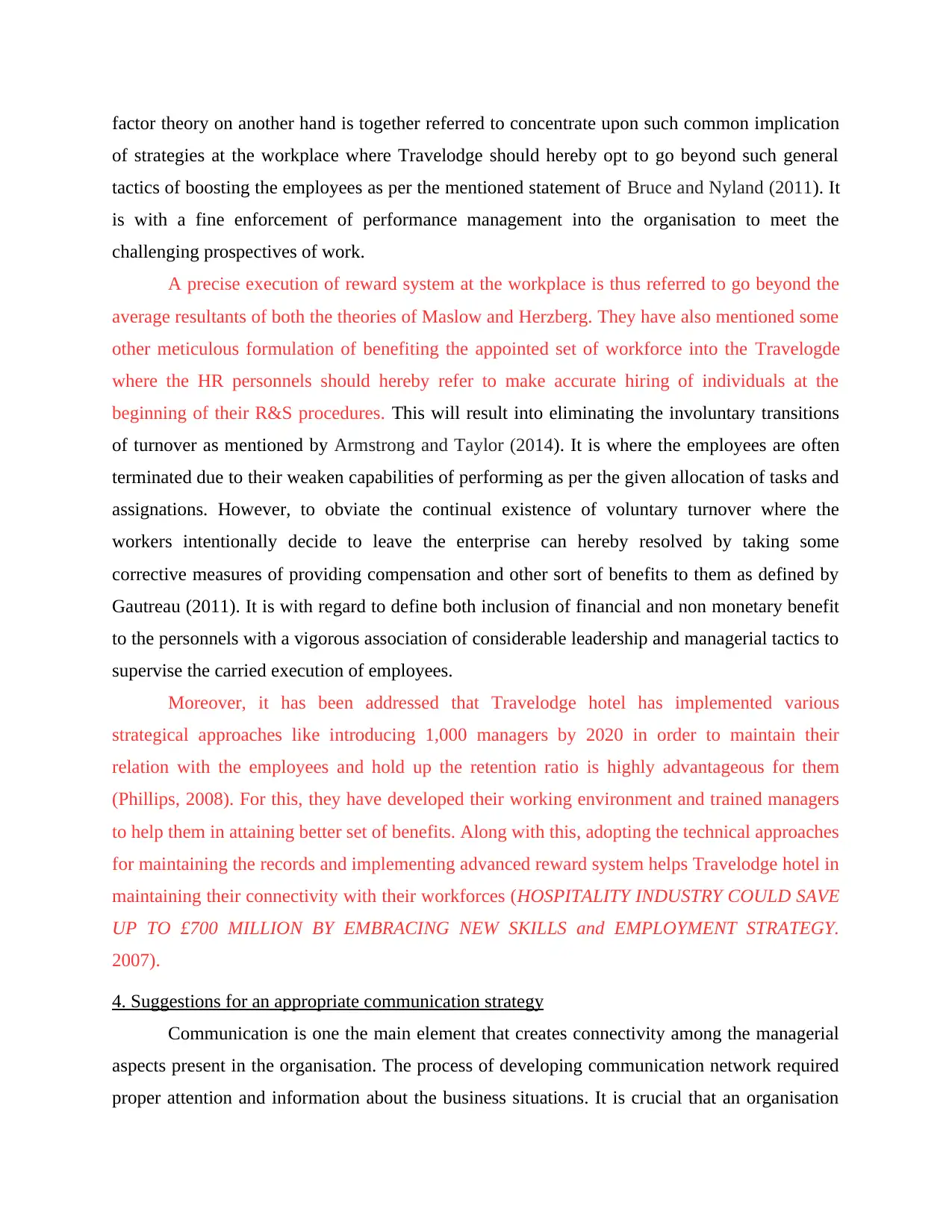
factor theory on another hand is together referred to concentrate upon such common implication
of strategies at the workplace where Travelodge should hereby opt to go beyond such general
tactics of boosting the employees as per the mentioned statement of Bruce and Nyland (2011). It
is with a fine enforcement of performance management into the organisation to meet the
challenging prospectives of work.
A precise execution of reward system at the workplace is thus referred to go beyond the
average resultants of both the theories of Maslow and Herzberg. They have also mentioned some
other meticulous formulation of benefiting the appointed set of workforce into the Travelogde
where the HR personnels should hereby refer to make accurate hiring of individuals at the
beginning of their R&S procedures. This will result into eliminating the involuntary transitions
of turnover as mentioned by Armstrong and Taylor (2014). It is where the employees are often
terminated due to their weaken capabilities of performing as per the given allocation of tasks and
assignations. However, to obviate the continual existence of voluntary turnover where the
workers intentionally decide to leave the enterprise can hereby resolved by taking some
corrective measures of providing compensation and other sort of benefits to them as defined by
Gautreau (2011). It is with regard to define both inclusion of financial and non monetary benefit
to the personnels with a vigorous association of considerable leadership and managerial tactics to
supervise the carried execution of employees.
Moreover, it has been addressed that Travelodge hotel has implemented various
strategical approaches like introducing 1,000 managers by 2020 in order to maintain their
relation with the employees and hold up the retention ratio is highly advantageous for them
(Phillips, 2008). For this, they have developed their working environment and trained managers
to help them in attaining better set of benefits. Along with this, adopting the technical approaches
for maintaining the records and implementing advanced reward system helps Travelodge hotel in
maintaining their connectivity with their workforces (HOSPITALITY INDUSTRY COULD SAVE
UP TO £700 MILLION BY EMBRACING NEW SKILLS and EMPLOYMENT STRATEGY.
2007).
4. Suggestions for an appropriate communication strategy
Communication is one the main element that creates connectivity among the managerial
aspects present in the organisation. The process of developing communication network required
proper attention and information about the business situations. It is crucial that an organisation
of strategies at the workplace where Travelodge should hereby opt to go beyond such general
tactics of boosting the employees as per the mentioned statement of Bruce and Nyland (2011). It
is with a fine enforcement of performance management into the organisation to meet the
challenging prospectives of work.
A precise execution of reward system at the workplace is thus referred to go beyond the
average resultants of both the theories of Maslow and Herzberg. They have also mentioned some
other meticulous formulation of benefiting the appointed set of workforce into the Travelogde
where the HR personnels should hereby refer to make accurate hiring of individuals at the
beginning of their R&S procedures. This will result into eliminating the involuntary transitions
of turnover as mentioned by Armstrong and Taylor (2014). It is where the employees are often
terminated due to their weaken capabilities of performing as per the given allocation of tasks and
assignations. However, to obviate the continual existence of voluntary turnover where the
workers intentionally decide to leave the enterprise can hereby resolved by taking some
corrective measures of providing compensation and other sort of benefits to them as defined by
Gautreau (2011). It is with regard to define both inclusion of financial and non monetary benefit
to the personnels with a vigorous association of considerable leadership and managerial tactics to
supervise the carried execution of employees.
Moreover, it has been addressed that Travelodge hotel has implemented various
strategical approaches like introducing 1,000 managers by 2020 in order to maintain their
relation with the employees and hold up the retention ratio is highly advantageous for them
(Phillips, 2008). For this, they have developed their working environment and trained managers
to help them in attaining better set of benefits. Along with this, adopting the technical approaches
for maintaining the records and implementing advanced reward system helps Travelodge hotel in
maintaining their connectivity with their workforces (HOSPITALITY INDUSTRY COULD SAVE
UP TO £700 MILLION BY EMBRACING NEW SKILLS and EMPLOYMENT STRATEGY.
2007).
4. Suggestions for an appropriate communication strategy
Communication is one the main element that creates connectivity among the managerial
aspects present in the organisation. The process of developing communication network required
proper attention and information about the business situations. It is crucial that an organisation
⊘ This is a preview!⊘
Do you want full access?
Subscribe today to unlock all pages.

Trusted by 1+ million students worldwide
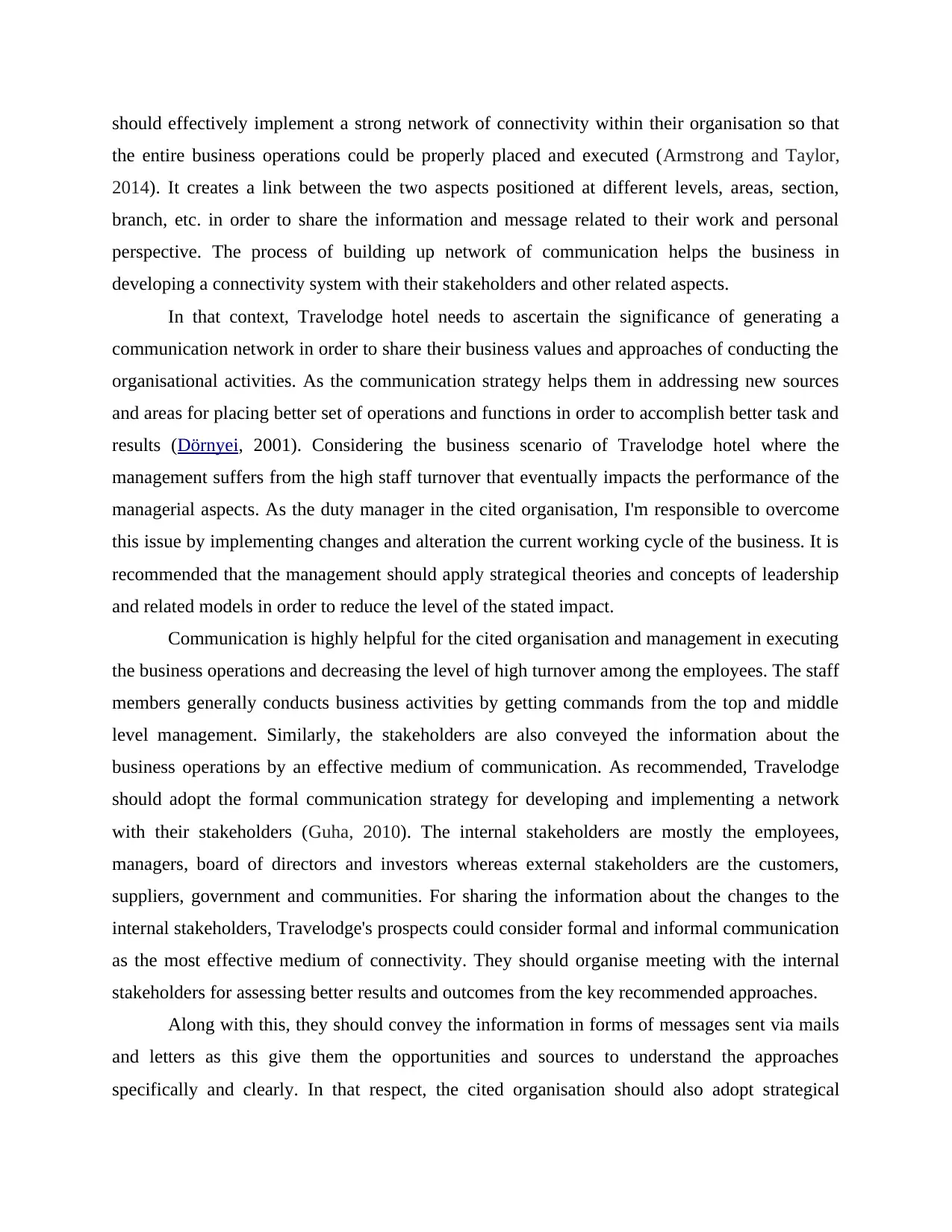
should effectively implement a strong network of connectivity within their organisation so that
the entire business operations could be properly placed and executed (Armstrong and Taylor,
2014). It creates a link between the two aspects positioned at different levels, areas, section,
branch, etc. in order to share the information and message related to their work and personal
perspective. The process of building up network of communication helps the business in
developing a connectivity system with their stakeholders and other related aspects.
In that context, Travelodge hotel needs to ascertain the significance of generating a
communication network in order to share their business values and approaches of conducting the
organisational activities. As the communication strategy helps them in addressing new sources
and areas for placing better set of operations and functions in order to accomplish better task and
results (Dörnyei, 2001). Considering the business scenario of Travelodge hotel where the
management suffers from the high staff turnover that eventually impacts the performance of the
managerial aspects. As the duty manager in the cited organisation, I'm responsible to overcome
this issue by implementing changes and alteration the current working cycle of the business. It is
recommended that the management should apply strategical theories and concepts of leadership
and related models in order to reduce the level of the stated impact.
Communication is highly helpful for the cited organisation and management in executing
the business operations and decreasing the level of high turnover among the employees. The staff
members generally conducts business activities by getting commands from the top and middle
level management. Similarly, the stakeholders are also conveyed the information about the
business operations by an effective medium of communication. As recommended, Travelodge
should adopt the formal communication strategy for developing and implementing a network
with their stakeholders (Guha, 2010). The internal stakeholders are mostly the employees,
managers, board of directors and investors whereas external stakeholders are the customers,
suppliers, government and communities. For sharing the information about the changes to the
internal stakeholders, Travelodge's prospects could consider formal and informal communication
as the most effective medium of connectivity. They should organise meeting with the internal
stakeholders for assessing better results and outcomes from the key recommended approaches.
Along with this, they should convey the information in forms of messages sent via mails
and letters as this give them the opportunities and sources to understand the approaches
specifically and clearly. In that respect, the cited organisation should also adopt strategical
the entire business operations could be properly placed and executed (Armstrong and Taylor,
2014). It creates a link between the two aspects positioned at different levels, areas, section,
branch, etc. in order to share the information and message related to their work and personal
perspective. The process of building up network of communication helps the business in
developing a connectivity system with their stakeholders and other related aspects.
In that context, Travelodge hotel needs to ascertain the significance of generating a
communication network in order to share their business values and approaches of conducting the
organisational activities. As the communication strategy helps them in addressing new sources
and areas for placing better set of operations and functions in order to accomplish better task and
results (Dörnyei, 2001). Considering the business scenario of Travelodge hotel where the
management suffers from the high staff turnover that eventually impacts the performance of the
managerial aspects. As the duty manager in the cited organisation, I'm responsible to overcome
this issue by implementing changes and alteration the current working cycle of the business. It is
recommended that the management should apply strategical theories and concepts of leadership
and related models in order to reduce the level of the stated impact.
Communication is highly helpful for the cited organisation and management in executing
the business operations and decreasing the level of high turnover among the employees. The staff
members generally conducts business activities by getting commands from the top and middle
level management. Similarly, the stakeholders are also conveyed the information about the
business operations by an effective medium of communication. As recommended, Travelodge
should adopt the formal communication strategy for developing and implementing a network
with their stakeholders (Guha, 2010). The internal stakeholders are mostly the employees,
managers, board of directors and investors whereas external stakeholders are the customers,
suppliers, government and communities. For sharing the information about the changes to the
internal stakeholders, Travelodge's prospects could consider formal and informal communication
as the most effective medium of connectivity. They should organise meeting with the internal
stakeholders for assessing better results and outcomes from the key recommended approaches.
Along with this, they should convey the information in forms of messages sent via mails
and letters as this give them the opportunities and sources to understand the approaches
specifically and clearly. In that respect, the cited organisation should also adopt strategical
Paraphrase This Document
Need a fresh take? Get an instant paraphrase of this document with our AI Paraphraser
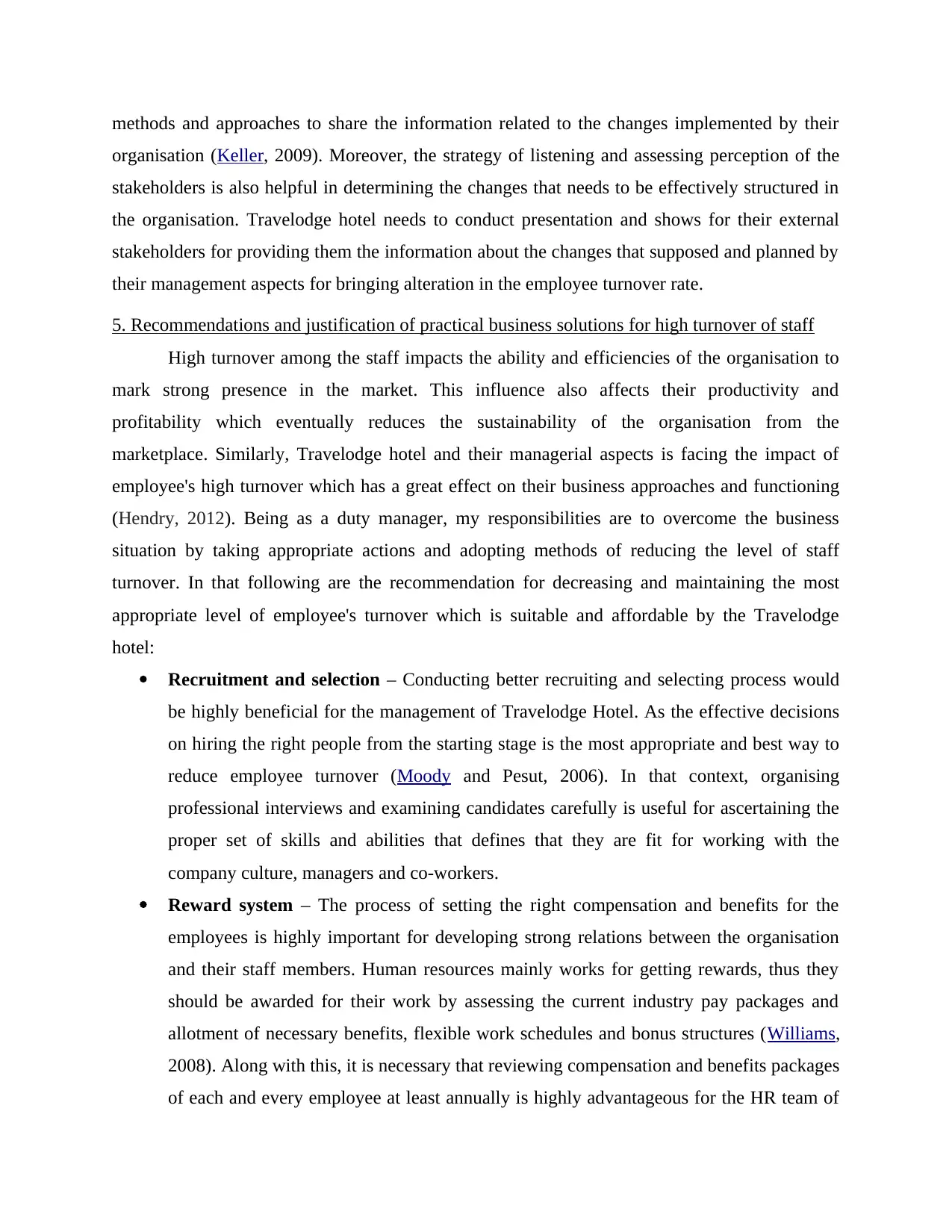
methods and approaches to share the information related to the changes implemented by their
organisation (Keller, 2009). Moreover, the strategy of listening and assessing perception of the
stakeholders is also helpful in determining the changes that needs to be effectively structured in
the organisation. Travelodge hotel needs to conduct presentation and shows for their external
stakeholders for providing them the information about the changes that supposed and planned by
their management aspects for bringing alteration in the employee turnover rate.
5. Recommendations and justification of practical business solutions for high turnover of staff
High turnover among the staff impacts the ability and efficiencies of the organisation to
mark strong presence in the market. This influence also affects their productivity and
profitability which eventually reduces the sustainability of the organisation from the
marketplace. Similarly, Travelodge hotel and their managerial aspects is facing the impact of
employee's high turnover which has a great effect on their business approaches and functioning
(Hendry, 2012). Being as a duty manager, my responsibilities are to overcome the business
situation by taking appropriate actions and adopting methods of reducing the level of staff
turnover. In that following are the recommendation for decreasing and maintaining the most
appropriate level of employee's turnover which is suitable and affordable by the Travelodge
hotel:
Recruitment and selection – Conducting better recruiting and selecting process would
be highly beneficial for the management of Travelodge Hotel. As the effective decisions
on hiring the right people from the starting stage is the most appropriate and best way to
reduce employee turnover (Moody and Pesut, 2006). In that context, organising
professional interviews and examining candidates carefully is useful for ascertaining the
proper set of skills and abilities that defines that they are fit for working with the
company culture, managers and co-workers.
Reward system – The process of setting the right compensation and benefits for the
employees is highly important for developing strong relations between the organisation
and their staff members. Human resources mainly works for getting rewards, thus they
should be awarded for their work by assessing the current industry pay packages and
allotment of necessary benefits, flexible work schedules and bonus structures (Williams,
2008). Along with this, it is necessary that reviewing compensation and benefits packages
of each and every employee at least annually is highly advantageous for the HR team of
organisation (Keller, 2009). Moreover, the strategy of listening and assessing perception of the
stakeholders is also helpful in determining the changes that needs to be effectively structured in
the organisation. Travelodge hotel needs to conduct presentation and shows for their external
stakeholders for providing them the information about the changes that supposed and planned by
their management aspects for bringing alteration in the employee turnover rate.
5. Recommendations and justification of practical business solutions for high turnover of staff
High turnover among the staff impacts the ability and efficiencies of the organisation to
mark strong presence in the market. This influence also affects their productivity and
profitability which eventually reduces the sustainability of the organisation from the
marketplace. Similarly, Travelodge hotel and their managerial aspects is facing the impact of
employee's high turnover which has a great effect on their business approaches and functioning
(Hendry, 2012). Being as a duty manager, my responsibilities are to overcome the business
situation by taking appropriate actions and adopting methods of reducing the level of staff
turnover. In that following are the recommendation for decreasing and maintaining the most
appropriate level of employee's turnover which is suitable and affordable by the Travelodge
hotel:
Recruitment and selection – Conducting better recruiting and selecting process would
be highly beneficial for the management of Travelodge Hotel. As the effective decisions
on hiring the right people from the starting stage is the most appropriate and best way to
reduce employee turnover (Moody and Pesut, 2006). In that context, organising
professional interviews and examining candidates carefully is useful for ascertaining the
proper set of skills and abilities that defines that they are fit for working with the
company culture, managers and co-workers.
Reward system – The process of setting the right compensation and benefits for the
employees is highly important for developing strong relations between the organisation
and their staff members. Human resources mainly works for getting rewards, thus they
should be awarded for their work by assessing the current industry pay packages and
allotment of necessary benefits, flexible work schedules and bonus structures (Williams,
2008). Along with this, it is necessary that reviewing compensation and benefits packages
of each and every employee at least annually is highly advantageous for the HR team of
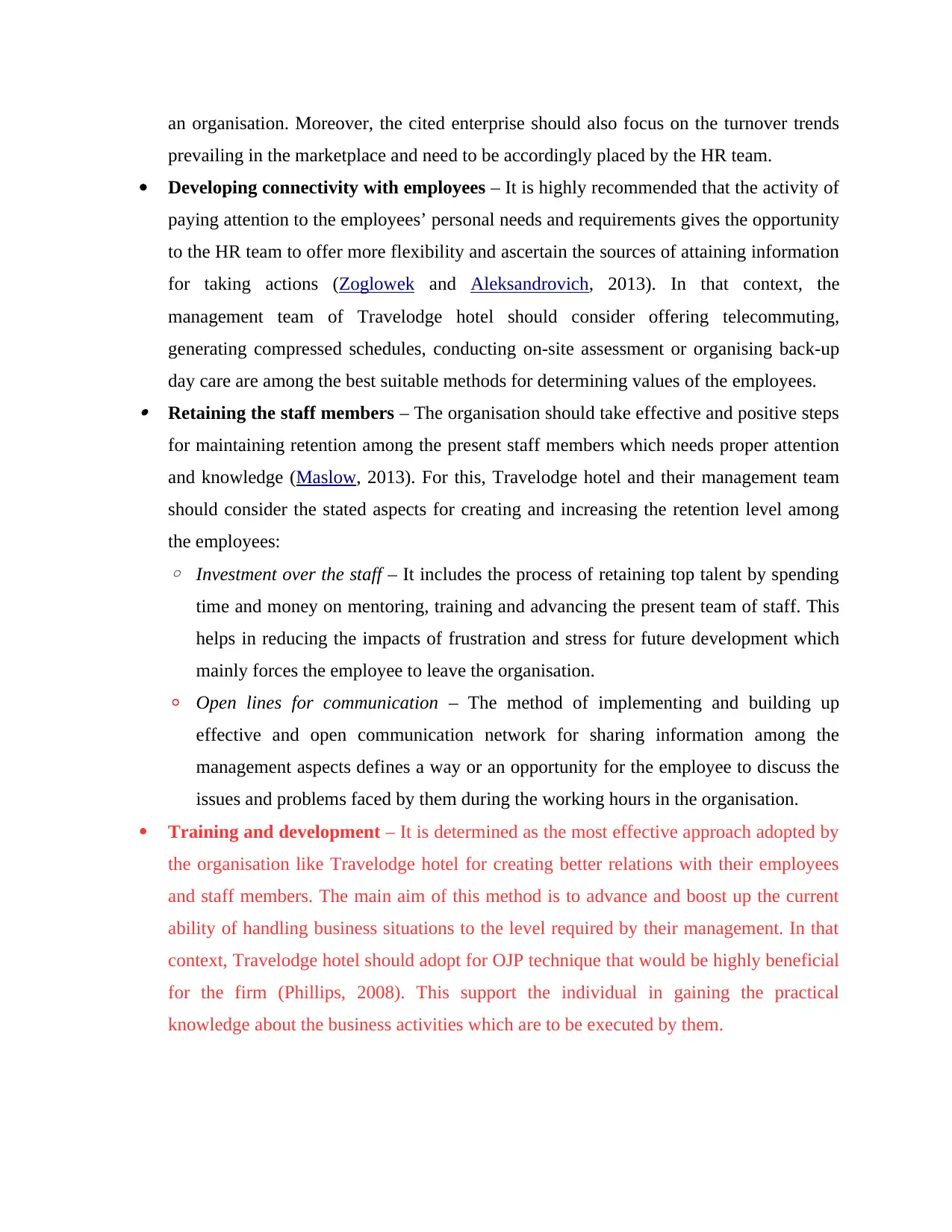
an organisation. Moreover, the cited enterprise should also focus on the turnover trends
prevailing in the marketplace and need to be accordingly placed by the HR team.
Developing connectivity with employees – It is highly recommended that the activity of
paying attention to the employees’ personal needs and requirements gives the opportunity
to the HR team to offer more flexibility and ascertain the sources of attaining information
for taking actions (Zoglowek and Aleksandrovich, 2013). In that context, the
management team of Travelodge hotel should consider offering telecommuting,
generating compressed schedules, conducting on-site assessment or organising back-up
day care are among the best suitable methods for determining values of the employees. Retaining the staff members – The organisation should take effective and positive steps
for maintaining retention among the present staff members which needs proper attention
and knowledge (Maslow, 2013). For this, Travelodge hotel and their management team
should consider the stated aspects for creating and increasing the retention level among
the employees:
◦ Investment over the staff – It includes the process of retaining top talent by spending
time and money on mentoring, training and advancing the present team of staff. This
helps in reducing the impacts of frustration and stress for future development which
mainly forces the employee to leave the organisation.
◦ Open lines for communication – The method of implementing and building up
effective and open communication network for sharing information among the
management aspects defines a way or an opportunity for the employee to discuss the
issues and problems faced by them during the working hours in the organisation.
Training and development – It is determined as the most effective approach adopted by
the organisation like Travelodge hotel for creating better relations with their employees
and staff members. The main aim of this method is to advance and boost up the current
ability of handling business situations to the level required by their management. In that
context, Travelodge hotel should adopt for OJP technique that would be highly beneficial
for the firm (Phillips, 2008). This support the individual in gaining the practical
knowledge about the business activities which are to be executed by them.
prevailing in the marketplace and need to be accordingly placed by the HR team.
Developing connectivity with employees – It is highly recommended that the activity of
paying attention to the employees’ personal needs and requirements gives the opportunity
to the HR team to offer more flexibility and ascertain the sources of attaining information
for taking actions (Zoglowek and Aleksandrovich, 2013). In that context, the
management team of Travelodge hotel should consider offering telecommuting,
generating compressed schedules, conducting on-site assessment or organising back-up
day care are among the best suitable methods for determining values of the employees. Retaining the staff members – The organisation should take effective and positive steps
for maintaining retention among the present staff members which needs proper attention
and knowledge (Maslow, 2013). For this, Travelodge hotel and their management team
should consider the stated aspects for creating and increasing the retention level among
the employees:
◦ Investment over the staff – It includes the process of retaining top talent by spending
time and money on mentoring, training and advancing the present team of staff. This
helps in reducing the impacts of frustration and stress for future development which
mainly forces the employee to leave the organisation.
◦ Open lines for communication – The method of implementing and building up
effective and open communication network for sharing information among the
management aspects defines a way or an opportunity for the employee to discuss the
issues and problems faced by them during the working hours in the organisation.
Training and development – It is determined as the most effective approach adopted by
the organisation like Travelodge hotel for creating better relations with their employees
and staff members. The main aim of this method is to advance and boost up the current
ability of handling business situations to the level required by their management. In that
context, Travelodge hotel should adopt for OJP technique that would be highly beneficial
for the firm (Phillips, 2008). This support the individual in gaining the practical
knowledge about the business activities which are to be executed by them.
⊘ This is a preview!⊘
Do you want full access?
Subscribe today to unlock all pages.

Trusted by 1+ million students worldwide
1 out of 21
Related Documents
Your All-in-One AI-Powered Toolkit for Academic Success.
+13062052269
info@desklib.com
Available 24*7 on WhatsApp / Email
![[object Object]](/_next/static/media/star-bottom.7253800d.svg)
Unlock your academic potential
Copyright © 2020–2026 A2Z Services. All Rights Reserved. Developed and managed by ZUCOL.



